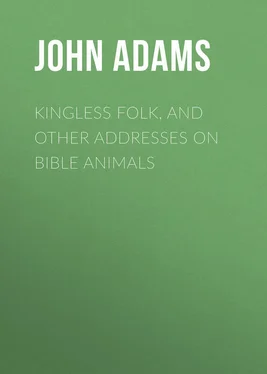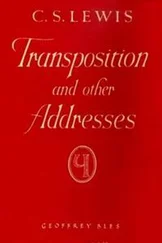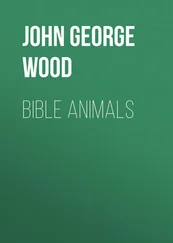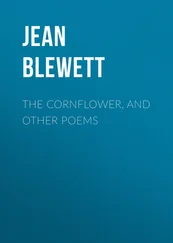John Adams - Kingless Folk, and other Addresses on Bible Animals
Здесь есть возможность читать онлайн «John Adams - Kingless Folk, and other Addresses on Bible Animals» — ознакомительный отрывок электронной книги совершенно бесплатно, а после прочтения отрывка купить полную версию. В некоторых случаях можно слушать аудио, скачать через торрент в формате fb2 и присутствует краткое содержание. Жанр: foreign_antique, foreign_prose, на английском языке. Описание произведения, (предисловие) а так же отзывы посетителей доступны на портале библиотеки ЛибКат.
- Название:Kingless Folk, and other Addresses on Bible Animals
- Автор:
- Жанр:
- Год:неизвестен
- ISBN:нет данных
- Рейтинг книги:4 / 5. Голосов: 1
-
Избранное:Добавить в избранное
- Отзывы:
-
Ваша оценка:
- 80
- 1
- 2
- 3
- 4
- 5
Kingless Folk, and other Addresses on Bible Animals: краткое содержание, описание и аннотация
Предлагаем к чтению аннотацию, описание, краткое содержание или предисловие (зависит от того, что написал сам автор книги «Kingless Folk, and other Addresses on Bible Animals»). Если вы не нашли необходимую информацию о книге — напишите в комментариях, мы постараемся отыскать её.
Kingless Folk, and other Addresses on Bible Animals — читать онлайн ознакомительный отрывок
Ниже представлен текст книги, разбитый по страницам. Система сохранения места последней прочитанной страницы, позволяет с удобством читать онлайн бесплатно книгу «Kingless Folk, and other Addresses on Bible Animals», без необходимости каждый раз заново искать на чём Вы остановились. Поставьте закладку, и сможете в любой момент перейти на страницу, на которой закончили чтение.
Интервал:
Закладка:
John Adams
Kingless Folk
"But Love, that moves the earth, and skies, and sea,
Beheld his old love in her misery,
And wrapped her heart in sudden gentle sleep;
And meanwhile caused unnumbered ants to creep
About her, and they wrought so busily
That all, ere sundown, was as it should be,
And homeward went again the kingless folk ."
The Ant
"Go to the ant, thou sluggard; consider her ways, and be wise: which having no guide, overseer, or ruler, provideth her meat in the summer, and gathereth her food in the harvest." – Prov. vi. 6-8.
Of what use is a sluggard? "Everything in the world is of some use," says John Ploughman, "but it would puzzle a doctor of divinity, or a philosopher, or the wisest owl in our steeple, to tell the good of idleness; that seems to me to be an ill wind which blows nobody any good, a sort of mud which breeds no eels, a dirty ditch which would not feed a frog. Sift a sluggard grain by grain, and you'll find him all chaff." A sluggard is really a good-for-nothing, and no better advice could be given to boys than this: "Get out of the sluggard's way, or you may catch his disease and never get rid of it. Grow up like bees, and you will never be drones."
In this passage from the Book of Proverbs, Solomon advises the sluggard to go back to school that he may learn wisdom , for his folly is quite equal to his idleness. He is too lazy to drive in a nail, and as the old jingling rhyme has it, "For want of a nail a shoe came off, for want of a shoe a horse was lost, for want of a horse a man was lost, for want of a man a battle was lost, and for loss of a battle a kingdom was lost." Because of the sluggard's first idleness in refusing to drive in the nail the whole kingdom comes down about his ears. It is not much ease he gets for all his scheming, and therefore he is sent back to school to learn wisdom.
The schoolmaster this time is the Ant , for, as the Bible tells us, "there be four things which are little upon the earth, but they are exceeding wise: the ants are a people not strong, yet they prepare their meat in the summer" (Prov. xxx. 24).
The wisdom taught by the ant is threefold.
If it be the hand of the diligent that maketh rich, the ants deserve to flourish; for there are few sluggards in their nest. The great mass of the teeming population is called " the workers ." There may be a few males and females in each community dressed in four beautiful gauze wings, and no doubt regarding themselves as very superior members of the society – the veritable aristocracy of ant life – but they never touch the work with one of their little fingers. The keeping of the nest, the gathering of the food, the care of the eggs, and the rearing of the young ants, all devolves on the shoulders of the willing workers; and they, though they have no wings at all, and are called "neutrals" and some other ugly names, cheerfully undertake the whole labour, and make the entire community flourish through sheer hard work.
And that is a splendid lesson for all young people. All great men, as well as all true ants, have been hard workers. This is the only royal road to success.
What Sir Joshua Reynolds said to his students is equally true when applied to other professions: "You must be told again and again that labour is the only price of solid fame, and that whatever your force of genius may be, there is no easy method of becoming a good painter. Nothing is denied to well-directed labour; nothing is to be obtained without it." Jesus Himself was a hard worker. Go, learn of the ant, and be wise.
Solomon adds that the ants carry on their labours without "guide, overseer, or ruler," and that is strictly the case. The ants are a feeble people, but they are perfectly self-reliant. The bees, for instance, have a royal personage in their hive. We call her the queen. And thus we may speak of bees as we speak of ourselves, as living under a monarchical government. But the ants have no king or queen. There is no royal personage in their nest. They are rather to be regarded as staunch republicans, who carry on their labours without any "ruler," guided simply by that unerring instinct which imitates the actings of reason. The silly sheep may require a shepherd to take care of them, but the sagacious ants can take care of themselves.
And all boys who are worth their salt must try to learn the same lesson. They must learn to strike out a path for themselves, and not be content to eat the bread of idleness. They must work for the good of the whole community by learning to stand on their own feet. They must despise the ignoble position of those who, having no mind of their own, are led like a flock of sheep by the will of another. They must think and act for themselves if ever they are to rise to a position of influence. In one word, they must be self-reliant. No doubt there is a sense in which we must be dependent on the labours of others. Every honest man is bound to acknowledge the assistance which he has received from his parents, his fellows, and his God. But the two things are not opposed. "These two things, contradictory though they may seem, must go together – manly dependence and manly independence, manly reliance and manly self-reliance" (Wordsworth). The two things stand or fall together. Self-reliance is not selfishness, manly independence is not ignorant braggadocio. The ants toil for the common weal. They rely on one another.
"They prepare their meat in the summer." This fact has been denied by modern entomologists. They have told us that ants are dormant in winter (at least in Europe), and, therefore, stand in no need of food. But, as one reminds us, "we had need to be very sure of our facts when we attempt to correct the Spirit of God" (Gosse). It has been amply ascertained that in the East and other warm countries where hibernation is impossible, ants do store up for winter use. It is even stated that these harvesting ants bite off the radicle at the end of the seed to prevent its germinating, and occasionally bring up their stores to the surface to dry, when the tiny granary has been entered and soaked by the rain.
It is at this point that the example of the ant is specially severe on the sluggard. In crass idleness he would sleep even in the time of harvest; but this little creature, the least of insects, avails herself of every suitable opportunity, and gathers a supply of food sufficient for her purposes. "He that gathereth in summer is a wise son, but he that sleepeth in harvest is a son that causeth shame." Let all boys then lay up for the future. Is it knowledge ? Let them sow well at school, that they may reap well in business. Is it character ? Let them sow well in youth, that they may reap well in manhood. Is it religion ? Let them sow well in time, that they may reap well in eternity. In all these connections let them be warned by these solemn words, "The sluggard will not plow by reason of the cold, therefore shall he beg in harvest, and have nothing" (Prov. xx. 4).
The Bear
"I will meet them as a bear that is bereaved of her whelps." – Hos. xiii. 8.
However ferocious a bear may be, she is also capable of a large and generous affection. She is at once a fond mother, a constant friend and, if one may so express it, a magnanimous foe. Her devotion to her young is proverbial. She possesses the strongest maternal instincts, and when to her easily roused ferocity the fury of these instincts is added, it may be imagined what the violence of her attack will be. Any one who threatens the safety of her cubs does so at his peril. The constancy of her friendship is shown by the following curious case, related by Brehm. He tells us of a little boy who crept one night for warmth and shelter into the cage of an extremely savage bear. The latter, instead of devouring the child, took him under its protection, kept him warm with the heat of its body, and allowed him to return every night to its cage. By-and-by the poor boy died from smallpox, and the bear, utterly disconsolate, henceforth refused all food, and soon followed its little protégé to the grave.
Читать дальшеИнтервал:
Закладка:
Похожие книги на «Kingless Folk, and other Addresses on Bible Animals»
Представляем Вашему вниманию похожие книги на «Kingless Folk, and other Addresses on Bible Animals» списком для выбора. Мы отобрали схожую по названию и смыслу литературу в надежде предоставить читателям больше вариантов отыскать новые, интересные, ещё непрочитанные произведения.
Обсуждение, отзывы о книге «Kingless Folk, and other Addresses on Bible Animals» и просто собственные мнения читателей. Оставьте ваши комментарии, напишите, что Вы думаете о произведении, его смысле или главных героях. Укажите что конкретно понравилось, а что нет, и почему Вы так считаете.












